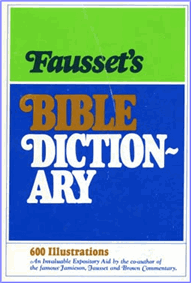Fausset's Bible Dictionary
A B C D E F G H I J K L M N O P Q R S T U V W X Y Z
Brass
With us a mixed metal, consisting of copper and zinc; but the brass of the Bible is one dug simple out of the earth (Deuteronomy 8:9; Job 28:2), probably copper. Bronze, a composition of copper and tin, extensively known in ancient times, may m some passages be meant. In Deuteronomy 33:25, "thy shoes shall be iron and brass," it is implied Asher should have a mine abounding territory. Keil and Delitzsch translate, "iron and brass shall be thy castle" min'al); Asher's dwellings were to be impregnable as if of iron and brass. Copper was used earlier than iron, its ductility being its recommendation for general use.
Tubal-cain is termed "the instructor of every artificer in brass and iron" (Genesis 4:22). "Brass" is used in a good sense for strength (Psalm 107:16; Jeremiah 1:18). In a bad sense, for impudent stubbornness (Isaiah 48:4; Jeremiah 6:28). For money, Matthew 10:9. In Leviticus 26:19, "I will make your heaven as iron, and your earth as brass," i.e. hard, yielding no rain, and producing no fruit. "Flesh of brass," i.e. invulnerable (Job 6:12). The thighs of brass in Nebuchadnezzar's image (Daniel 2:32) represent the brazen armed Greeks. In Revelation 1:15," His feet like unto fine brass," rather, "glowing brass, as if they had been made red hot in a furnace."
Bibliography Information
Fausset, Andrew Robert M.A., D.D., "Definition for 'brass' Fausset's Bible Dictionary".
bible-history.com - Fausset's; 1878.
Copyright Information
© Fausset's Bible Dictionary
Fausset's Bible Dictionary Home
Bible History Online Home
Bible Encyclopedia (ISBE)
Online Bible (KJV)
Naves Topical Bible
Smith's Bible Dictionary
Easton's Bible Dictionary
Schaff's Bible Dictionary
Fausset's Bible Dictionary
Matthew Henry Bible Commentary
Hitchcock's Bible Dictionary

Dr. A.R. Fausset
Popular and Trending:
Meaning and definition of fasting, what is fasting in the bible, fasting definition, why should I fast, the power of prayer and fasting, Location of Galilee, where was galilee in the bible?, fasting definition, Galilee region, cities of Galilee, Sea of Galilee, Definition of biblical fire, what is fire in the bible?, fire and brimstone, fire meaning, baking bread with fire, Definition of the biblical firmament in Genesis, what is the firmament in the bible?, was the firmament the third heaven, firmament meaning, did the firmament bring the flood of Noah?.
